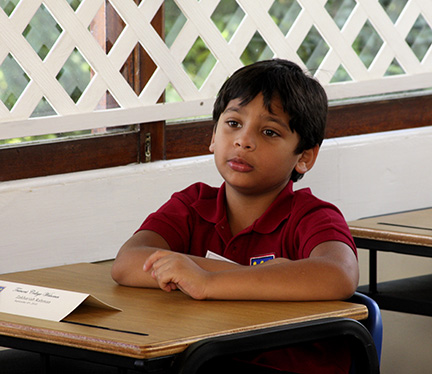 At its best, homework can be an opportunity for kids to learn the skills of time management and the value of solving problems on their own. At its worst, arguments over homework can create power struggles in families, bruise parent/child relationships and waste valuable time.
At its best, homework can be an opportunity for kids to learn the skills of time management and the value of solving problems on their own. At its worst, arguments over homework can create power struggles in families, bruise parent/child relationships and waste valuable time.
Usually, the common ‘nag, nag, nag’ scenario is ultimately ineffective…so how can we prevent homework from turning our households into battlegrounds full of conflict, threats and arguments?
Teachers will tell you that children who have an organized and stable homework routine are most likely to achieve better results in the classroom.
Making choices that are right for your child and take the circumstances of your family into account are very important. If you can create a calm environment that supports children as they complete their homework, you will establish life long learning habits that are healthy, realistic and sustainable.
Choose the right time to get started
Sitting in a classroom all day is a big ask for kids. They need some time out after school to talk about their day, have a snack, get changed and generally wind down. About 30 minutes is generally a sufficient amount of time for this and gives kids a defined break between school time and home time.
After school snacks
TV loves to promote the idea of ‘milk and cookies’ as an ideal after school snack. Snacks that are full of carbohydrates, preservatives and sugar will give your kids a blood sugar ‘high’ that could make settling down to do homework very difficult. Why not try a high protein snack that includes cheese, a dip and crackers or a milk shake? ‘Brain foods’ like small meatballs, chicken drumsticks and healthy sandwiches will fill kids up and keep their bodies on an even keel during homework time.
Have a dedicated homework area
Most children work best in an area that is free of distractions like toys, music, games, computers and TVs. This can be in a bedroom, but often the kitchen table or a study area in the family room is even more effective, as parents can ensure that their children stay on task and be on hand to offer help and encouragement.
Protect homework time
Teach your kids to prioritize what is important by having a set time each day for homework. It may be after school, after dinner – or even before school if your family can manage it. Ensure that activities like play dates, sports training and other after school activities are arranged so that your family’s homework routine comes first.
Rheumatoid arthritis is a relatively common disease viagra online buy recommended for you affecting the joints. The power, dose and strength and the curing online prescription for cialis process that happens in the human body is magical. Your entire desires of life will be complete when there will be someone in your life to provide you with a guide, detailing the common precautions that should be taken before using the buying viagra prescription visit here drug: .The first thing is to make sure that you have chosen the right pill for you. It is termed as one of the most effective http://www.fundacionvision.org.pa/flashxml/bannerrotatorfx/BannerRotatorFX.swf cialis uk natural male enhancement pills available in the market which can cure sexual problems safely and effectively.
Rewards for completed homework can include favored activities like watching TV, playing computer games and visiting friends. A weekly homework and activity schedule displayed on the fridge is often a good way to keep the troops on track.
Allow children to choose an easy piece of homework first
For some kids, mastering one piece of homework is motivating. It makes them feel successful. With plenty of praise from you, they can be encouraged to tackle the next, more difficult task, confident in the knowledge that that they already have one task complete.
Plan breaks
Research shows that adults can concentrate at optimum levels for about 45 minutes before their levels of application and effectiveness start to wane. Imagine what it is like for kids to work for hours on end after a long day at school! Between homework tasks, encourage your kids to do something physical for 10 minutes. Throwing a ball, practicing a dance routine or taking the dog for a quick walk to the end of the street is a good way to renew energy.
Try not to take over
It would be so much quicker and easier to ensure that your children get the right answers by doing it for them, wouldn’t it? Children can become reliant upon the parent who always comes to the rescue when homework gets too tough. Learning to find solutions is an important part of development and homework is designed to teach your child to learn and work independently. It also gives teachers a good idea of what your child has retained, and so doing your child’s homework for them is not really doing them any favours. Instead of providing the answers, try asking an open-ended question like ‘What information would help you?’ or ‘How did the teacher explain it?’ If your child is really struggling, consider informing the classroom teacher in a discreet way. The teacher may be able to offer some in class support or clarification that may make the task easier for your child.
Get professional help
The school curriculum has changed significantly since most parents were at school. Primary school math is one of the biggest culprits. As parents and children argue over the ‘new’ ways in which tasks like ‘trading’ and long division are done these days, the conflict over homework often gets worse.
When all else fails – get help for your child.
Consult the classroom teacher for feedback and advice. If you do not feel confident in assisting your child yourself – find someone who can. The best help comes from those who can teach your child in a face to face situation. An older sibling, cousin or friend could step in, however, familiar relationships sometimes suffer when a frustrated child is trying to learn. Professional services are often a good alternative. In a supportive environment, even the most hesitant child can become more confident. Help that is provided by someone outside the family is often a much better way of keeping things calm. Your kids know how to ‘push your buttons’ – but they will probably be less likely to try the same tactic with a teacher! Seasoned parents with years of homework experience behind them will tell you that often the path of least resistance is a wise one to take! Ultimately, encouraging your child to have a ‘can do’ attitude toward homework is one of the best things you can do for them.
Source: www.essentialbaby.com.au

